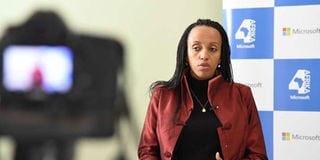Innovate, Microsoft tells Africa

Amrote Abdella, the regional director for Microsoft 4Afrika. She says enhanced productivity and collaboration tools that connect farmers, field personnel, suppliers and researchers will be vital for agriculture's success in the country and beyond. PHOTO | POOL
What you need to know:
- Despite this, Sub-Saharan Africa faces the greatest food security risk. By 2050, its population is expected to increase 2.5-fold.
- The Digitalisation of African Agriculture Report found that despite 400 solutions in play, 90 per cent of the market for digital solutions in agriculture remains untapped.
- Data and advanced analytics can be used to predict short-term weather and the effect on a farm. Investors are also following agri-space and scouting for scalable solutions across markets.
- Forecasts from the research say the figure will be close to $15.9 billion in 2023. Widespread use of this technology still has a way to go in Africa.
Faustine Ngila spoke to Amrote Abdella, the regional director for Microsoft 4Afrika, about digital platforms changing farming
Why is it becoming important for Africa to innovate in agriculture?
Agriculture accounts for 65 per cent of Kenya’s export earnings. It provides livelihood for more than 80 per cent of the population.
Despite this, Sub-Saharan Africa faces the greatest food security risk. By 2050, its population is expected to increase 2.5-fold.
Because of this, agricultural transformation has become a priority on policy agenda. Just half a tonne increase in staple yields could generate a 13-20 per cent higher GDP in many developing countries.
Innovations offer powerful tools that can revolutionise agriculture. To manage rising demands in a sustainable way, it is imperative for every player to embrace opportunities offered by technology.
The Digitalisation of African Agriculture Report found that despite 400 solutions in play, 90 per cent of the market for digital solutions in agriculture remains untapped.
Which innovations are driving growth in the sector in Africa?
Effective use of technology can support food security and unlock opportunities that can attract young people into agribusiness. Multinationals, industry leaders and entrepreneurs have started seeing potential in this sector.
Precision farming techniques are an example of how technology is changing the industry.
Data and advanced analytics can be used to predict short-term weather and the effect on a farm. Investors are also following agri-space and scouting for scalable solutions across markets.
Agritech start-ups across the continent accumulated Sh1.3 billion in funding in 2017. Twiga Foods recently raised Sh2.3 billion in funding from Goldman Sachs Group to enable it invest in technology-driven commercial solutions.
Microsoft has spent years looking for and investing in agritech solutions.
We have provided technical, financial and market support to African Agritech solution providers, including N-Frnds, Twiga Foods, Tulaa, AGIN and SunCulture.
FAO has published a report recommending the use of blockchain to boost yields. Is Africa ready for this?
Global spending on blockchain solutions reached Sh200.7 billion by the end of 2019. This is according to the International Data Corporation.
Forecasts from the research say the figure will be close to $15.9 billion in 2023. Widespread use of this technology still has a way to go in Africa.
What challenges in agro production can be solved by technology in 2020?
By 2050, the world’s population will increase to 9.1 billion, requiring double the current crop production and 70 per cent more food. Agriculture must meet this demand using only five per cent more land while minimising use of resources.
As production scales up to meet demand, the current emissions and resource use trajectory is not sustainable.
Diet and taste are shifting. Food preferences are also changing. Despite advances in the early 20th century, global crop yields cannot keep pace with the growing demand. Advanced technology is rapidly transforming every aspect of agricultural operations.
What can be done for Africa to move at the same speed regarding 4 IR in agriculture?
With advanced technology, there is an opportunity to leapfrog the trajectory of adopting these technologies. With AI, we can use local language to provide timely information to the farmers on pest control, advice and so on.
It also provides a chance for two-way interaction with the farmer, where we can collect data and customise extension services.
At a national level, there is an opportunity to digitise the food balance sheet and predict when to import or export food.
To what extent will technology improve crop and animal production in 2020?
Given the progress made on the continent, I am confident 2020 will bring more sustainable solutions, investment and progress for farmers.
Organisations and industry leaders will partner to achieve the much-needed steps for a sustainable agriculture.
Microsoft is in a unique position to help firms digitally transform. Our strategy is to build products and services based on a mobile first-cloud first approach and to deliver a flexible, relevant platform of integrated offerings. We are able to provide this through Big Data and advanced analytics tools.
Enhanced productivity and collaboration tools that connect farmers, field personnel, suppliers, researchers, allowing them to work anywhere, anytime on any device will be vital.
Greater mobility for field workforce and trusted cloud services to aggregate and process data sets in a secure manner will be a game-changer.



